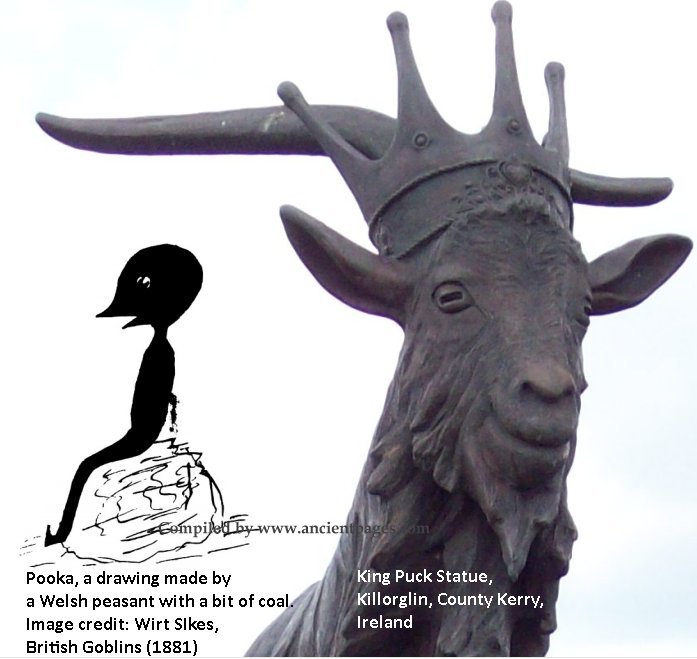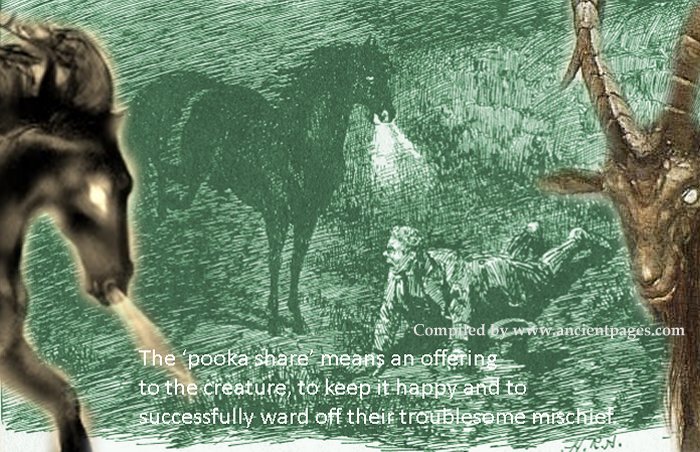Mischievous Irish Pooka, Shapeshifter And Prankster Has Its Counterparts
A.Sutherland - AncientPages.com - In our earlier article on AncientPages, we described Pooka, a prankster and a shapeshifter that could take many forms from a black horse to a human.
Pooka is known to be one of the most famous, evil, and feared faeries in Ireland, associated with both good and bad luck.
Tales of very similar creatures are widespread in other parts of the British Isles and even further south in Normandy, France, especially among the Celtic cultures of Northwest Europe.
The Pooka is not unique to Ireland. Ancient Cornish myths and legends tell about a small, human-like creature (a kind of hobgoblin) known to ancient people as ‘bucca’. Similar to the pooka that usually troubles people on the ground, the Cornish hobgoblin bucca, lives among fishermen and can help them or make various troubles to them when not appeased.
The tradition says that bucca goblin, also identified as the ‘black spirit’, had once much better reputation and was a Celtic sea god who declined to the status of demon or hobgoblin. Similar to the Irish pooka is also another prankster that originates in the Cornish lore. This black creature - known as the buggane - also can suddenly change its shape and deliver many troubles.
Many people don’t really understand why, because there are no records of any incidents of the pooka or bucca or another goblin, actually causing a human any harm.
Likewise, there are no known records of capturing any of them or taking photographs, but … just in case, people continue an old tradition to keep these creatures calm and happy.
To stay in good with the bucca, fishermen traditionally leave a fish from their latest catch on the sand or/and toss a piece of bread over their left shoulder and spill a little bit of their beer on the ground. It keeps the bucca quiet and happy.
Also to avoid trouble and chaos within a society, the local people have developed a certain tradition to keep goblins like pooka, happy. It happens that farmers leave behind the so-called ‘pooka share’ suring harvest season.
The ‘pooka share’ means an offering to the creature, to keep it happy and to successfully ward off their troublesome mischief.
This pooka-like trickster goblin was said to knock on doors and then immediately disappear before someone inside opened them.
Just across the English Channel, on the European continent, there are regions such as Britany and Normandy, France, once strongly influenced by ancient Celtic cultures. In the mythologies of these regions, there is an ancient, deep-rooted belief in a mysterious creature known as a ‘pouque’ and stone outcroppings and certain megalithic structures called ‘pouquelée’.
Written by – A. Sutherland - AncientPages.com Senior Staff Writer
Copyright © AncientPages.com All rights reserved. This material may not be published, broadcast, rewritten or redistributed in whole or part without the express written permission of AncientPages.com
More From Ancient Pages
-
 Fenrir: Oldest Of Three Monstrous Children Of God Loki In Norse Mythology
Featured Stories | Mar 28, 2018
Fenrir: Oldest Of Three Monstrous Children Of God Loki In Norse Mythology
Featured Stories | Mar 28, 2018 -
 Noppera-bo: Odd Intimidating Human-Like Faceless Yokai In Japanese Folklore
Japanese Mythology | Jul 23, 2024
Noppera-bo: Odd Intimidating Human-Like Faceless Yokai In Japanese Folklore
Japanese Mythology | Jul 23, 2024 -
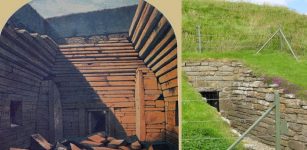 Upside Down Chambers For The Dead Found At Maeshowe, Orkney
Archaeology | Sep 8, 2020
Upside Down Chambers For The Dead Found At Maeshowe, Orkney
Archaeology | Sep 8, 2020 -
 Cynane: Talented Female Military Leader Assassinated While Giving A Speech
Featured Stories | Mar 5, 2019
Cynane: Talented Female Military Leader Assassinated While Giving A Speech
Featured Stories | Mar 5, 2019 -
 Unexplained Encounters With Unknown Beings In California – Old And Modern Reports
Featured Stories | Mar 11, 2024
Unexplained Encounters With Unknown Beings In California – Old And Modern Reports
Featured Stories | Mar 11, 2024 -
 Mystery Of Biblical Noah’s Strange Connection With Red-Skinned Giants And The Watchers – Celestial Secrets – Part 2
Ancient Mysteries | Jan 28, 2021
Mystery Of Biblical Noah’s Strange Connection With Red-Skinned Giants And The Watchers – Celestial Secrets – Part 2
Ancient Mysteries | Jan 28, 2021 -
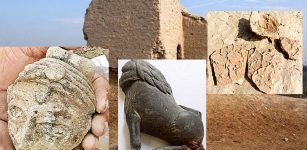 Buddhist ‘Dillu Roy’ Resembles Mohenjo Daro And Harappa And Now Unveils Its Ancient Secrets
Archaeology | Aug 25, 2020
Buddhist ‘Dillu Roy’ Resembles Mohenjo Daro And Harappa And Now Unveils Its Ancient Secrets
Archaeology | Aug 25, 2020 -
 Gods’ Creation Of Five Different Human Races – Ages Of Man On The Earth And The End Of The World
Featured Stories | Jan 26, 2018
Gods’ Creation Of Five Different Human Races – Ages Of Man On The Earth And The End Of The World
Featured Stories | Jan 26, 2018 -
 Dozens Of Giant ‘Lost’ Nazca Geoglyphs Unearthed By Drones In Peru
Archaeology | Apr 7, 2018
Dozens Of Giant ‘Lost’ Nazca Geoglyphs Unearthed By Drones In Peru
Archaeology | Apr 7, 2018 -
 Ancient People Handled Sun Exposure Better Than Modern People – An Anthropologist Explains Why
Featured Stories | Sep 21, 2022
Ancient People Handled Sun Exposure Better Than Modern People – An Anthropologist Explains Why
Featured Stories | Sep 21, 2022 -
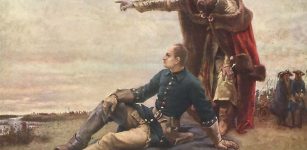 On This Day In History: Peter The Great Defeats Charles XII Of Sweden At The Battle Of Poltava – On June 28, 1709
News | Jun 28, 2016
On This Day In History: Peter The Great Defeats Charles XII Of Sweden At The Battle Of Poltava – On June 28, 1709
News | Jun 28, 2016 -
 Baffling Structures Unearthed In A Place Where Prehistoric Human Remains Are Missing Is An Ancient Mystery
Ancient Mysteries | Apr 19, 2021
Baffling Structures Unearthed In A Place Where Prehistoric Human Remains Are Missing Is An Ancient Mystery
Ancient Mysteries | Apr 19, 2021 -
 Coventry’s Mysterious Ogham Stone Displayed At Herbert Art Gallery And Museum
Archaeology | May 18, 2024
Coventry’s Mysterious Ogham Stone Displayed At Herbert Art Gallery And Museum
Archaeology | May 18, 2024 -
 Small House With Beautiful Mythical Frescoes Discovered In Pompeii
Archaeology | Nov 4, 2024
Small House With Beautiful Mythical Frescoes Discovered In Pompeii
Archaeology | Nov 4, 2024 -
 Codes Of Ur Nammu: World’s Oldest Known Law Code
Ancient History Facts | Mar 11, 2016
Codes Of Ur Nammu: World’s Oldest Known Law Code
Ancient History Facts | Mar 11, 2016 -
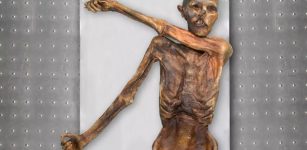 Ötzi Had Dark Skin, Bald Head And Anatolian Ancestry- DNA Reveals
Evolution | Aug 16, 2023
Ötzi Had Dark Skin, Bald Head And Anatolian Ancestry- DNA Reveals
Evolution | Aug 16, 2023 -
 Why Are Statues Of Mythical Yeti Dividing People In The Himalayas?
Featured Stories | Feb 18, 2020
Why Are Statues Of Mythical Yeti Dividing People In The Himalayas?
Featured Stories | Feb 18, 2020 -
 On This Day In History: England’s Act Against Multipliers Signed Into Law – On Jan 13, 1404
News | Jan 13, 2017
On This Day In History: England’s Act Against Multipliers Signed Into Law – On Jan 13, 1404
News | Jan 13, 2017 -
 Well-Preserved 7,300-Year-Old Wooden Cabins Discovered In La Draga
Archaeology | Oct 23, 2023
Well-Preserved 7,300-Year-Old Wooden Cabins Discovered In La Draga
Archaeology | Oct 23, 2023 -
 On This Day In History: Seismologist Charles Richter Was Born – On Apr 26, 1900
News | Apr 26, 2016
On This Day In History: Seismologist Charles Richter Was Born – On Apr 26, 1900
News | Apr 26, 2016

